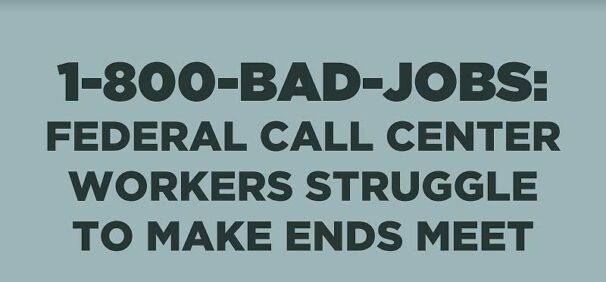
RIVERVIEW, Fla.—When Katherine Charles’ son, age 16, wants to buy a basketball or a baseball glove to play with his friends, his mother, a call center worker for Maximus, a federal contractor whose workers help people enroll in the Affordable Care Act’s coverage, faces an uncomfortable choice.
Buy him the basketball or the baseball glove, or spend their limited funds on food.
That’s how low the pay is at the call center, which has 10,000 workers normally at its Riverview, Fla., building and an extra 2,000 or so every November, during Medicare’s, Medicaid’s, and the ACA’s “open enrollment” season.
It’s pay like that, $16 an hour or so, that’s pushing the Maximus call center workers to unionize with the Communications Workers. It’s also pushing them close to a strike in early November, against Maximus’ anti-union bosses in a right-to-work state.

So CWA brought Charles to D.C. in mid-October to present the workers’ case, in person, to the big boss who—she hopes—can do something about it: Biden administration Health and Human Services Secretary Xavier Becerra.
After all, Biden has made both fair pay and union pay rates a cornerstone of his domestic economic policy. Charles and CWA want Becerra to stand by Biden’s promises; his HHS pays Maximus.
Charles approached Becerra at an Oct. 17 event, with CWA’s study of Maximus’s low pay and high health care costs for its own workers in her hands, and a request: In keeping with the Biden administration’s declared pro-worker and pro-union policy, do something about this.
She handed Becerra CWA’s devastating study of Maximus, 1-800-BAD JOBS, and spoke to him briefly about pay and working conditions there. Maximus’s CEO, Bruce Caswell, exploits the call center workers while the firm rakes in lavish earnings—$4.6 billion last year—the study says.

Of that cash, all from Becerra’s Health and Human Services Department, Maximus doled out $474 million during the coronavirus pandemic of the last three years in dividends and stock buybacks.
And Caswell received $20 million in pay and perks in those three years, while his workers, like Charles, struggled to earn enough to pay for food. Now Charles, speaking for her colleagues, is taking their story public, to the rest of the labor movement and the rest of the country.
“I’ve been working for nine years, and it’s been a struggle” all the way, Charles said in an exclusive interview with People’s World. Raises are few and far between “and the path to grow is very narrow, almost non-existent.
“We often enroll children in Medicaid,” she adds, but many of the workers, including her, are paid so little they’re on the program, too.
Those Medicaid-enrolled children include Charles’ own two: The 16-year-old boy and a 10-year-old girl. The girl doesn’t realize yet how her mother must scrimp and save and how they have to do without, just to put food on the table. Her brother does.
“The 16-year-old sees his friends doing things” like playing sports at the local high school. He wants to, also, but he can’t.
“How do I explain that if I do” pay the fees the local schools require, “we don’t have the money for groceries?
“For them, Medicaid covers everything except glasses. I have to borrow money from my parents for the glasses.”
Charles has her own medical problems, but she can’t afford to take care of them, she says. Not on a salary which began at $16.02 per hour at the Maximus call center and hasn’t risen very far in nine years. “Our wages don’t cover everything,” she says. “That’s why we’re asking for $25 an hour.”
Neither does Medicaid. Charles has a chronic health condition which requires doctors’ visits every three months. She hasn’t gone in a year and a half, because Medicaid pays for only one visit a year. If Charles went as often as she should, her out-of-pocket cost would be $3000 yearly.
It’s pay and conditions like this that led the workers to join the CWA and prepare, if necessary, to strike. Others take multiple part-time jobs. Some leave the call center for other, better-paying work, but all live in the high-cost Orlando, Fla., area.
“While the CEO is making millions, we are struggling. We haven’t had a raise since 2020. We’re not asking them to break the bank, just to help a little.” Charles added her wages are supposed to rise with inflation since she works for a federal contractor. They haven’t since 2020.
Maximus’s reaction to CWA’s organizing drive has been just what you’d expect from private enterprise in right-to-work Florida, even if it depends on the feds for all of its income. It fired people.
“This year they let go about 700 because they were actively monitoring people,” Charles said of Maximus’s bosses. “They even fired people who didn’t have anything to do with the union. My co-workers are very scared.”
Naturally, none of this is on Maximus’s website. It touts “a distinct vision of government, where citizens connect with services more efficiently. Leading-edge technology and the human touch work hand in hand. And increased accuracy, accountability, and productivity are part of every program.”
It also keeps a lobbying office in Virginia, another right-to-work state, to ensure the federal dollars keep flowing. OpenSecrets.org, which tracks campaign financing, reports Maximus gave $5.3 million to Democrats in the 2021-22 election cycle and $2.43 million to Republicans.
All this hasn’t stopped CWA from going public with its study and with the workers’ stories. But it hasn’t produced a response from Secretary Becerra, yet. Charles hopes for one, quickly.
“While the CEO is making millions, we are struggling. But every time we do this, this is a little more pressure we’re putting on Maximus.”












Comments